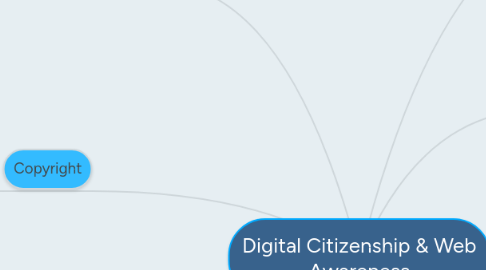Digital Citizenship & Web Awareness
by Elyse Mastel


1. Copyright
1.1. Legality
1.1.1. "Copyright Matters": gives teachers an idea on the legality of copyrights
1.2. Protecting intellectual rights of the author/creator
1.3. Fair use: where is the line between protecting intellectual rights and using found information
1.4. Creative Commons: allows author to associate with his work the rights that the user will have
1.5. Moral obligation of the teacher to proved an environment where appropriate use of these materials is modeled and taught
1.5.1. Teacher Role
1.6. Issues with copying and pasting
2. Authenticity of Web Resources
2.1. Quality/bias/perspective of information
2.2. Failing to evaluate where, who the author is, how reliable the source is, and what biases exist
2.3. Authenticity and authority of websites
2.4. Fact or Folly: the validity of a site and its content
2.5. Email Validity: how to decipher what is junk
2.6. Marketing: how they target audiences
3. Privacy
3.1. To extent is the information that you share online safe?
4. Online Learning
4.1. "Coping with Overload": udging good recources
4.2. Value
4.3. Lack of teacher expertise in schools on certain topics--can be learned online
4.4. Available 24/7
4.5. Cater to students needs--can learn at their own pace
4.6. Students brains are wired differently today than the past
4.7. 21st Century Classroom
5. Web Awareness
5.1. Book-cyberbullying and ethical online behvaiour
5.2. Teachers take active steps to promote digital citizenship
5.3. Media Smarts
5.3.1. Help teachers and parents with media awareness
5.4. U of L's "Cybertalk"
5.4.1. Study highlights youths' lack of awareness about online safety
5.5. Impact of Sexually Explicit Material
5.5.1. Good Pictures Bad Pictures (book)
5.6. Cyberbullying
5.7. Web Awareness for Teachers
5.7.1. "in loco parentis": the teacher stands as an unofficial guardian of the child when the parent is not present
